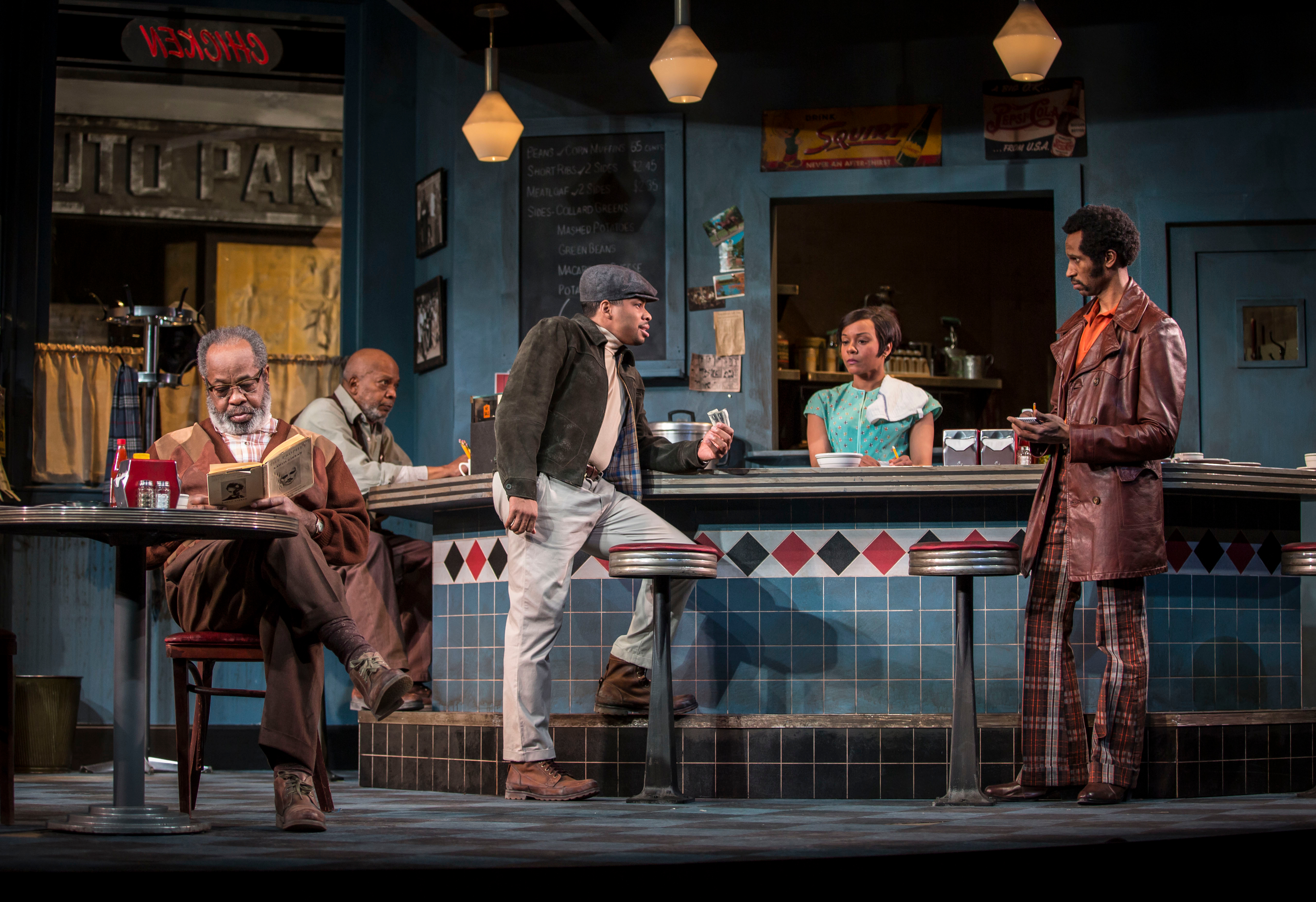
A scene from August Wilson’s Two Trains Running at The Goodman Theatre, Chicago
by Candace Hunter, Arts & Culture Editor
One of the most honored and celebrated American playwrights is arguably August Wilson. A boy from Pittsburgh, Pennsylvania. A boy from a missing father household. A boy whose genius was greater than his teachers imaginings. Accused of plagiarism at 15, he left school and settled for an informal education amongst the laughter, cadence and rhythms of the denizens of the Hill District in Pittsburgh.
Always seen with a pencil and napkins/scrap of paper, Wilson’s mind would never rest. He saw everything, heard everything, recorded much. Before his death in 2005, he succeeded in doing what none other had – he chronicled the lives of the Everyman and Everywoman in the African American community during the 20th Century. Ten plays, all set in Pittsburgh, tell the intimate stories of humans not often examined in American drama. His plays also tell the larger story of America’s history and the impact of race on that history.
The seventh play in the cycle, “Two Trains Running” opened to a standing ovation at the Goodman Theatre this past weekend. The Goodman offers this play as the lynchpin of a two month long series of programming, “Celebrating a Legend: August Wilson at the Goodman”. This production is directed by Chuck Smith, an Associate Artistic Director at the Goodman and a man intimately familiar with the works and ways of Wilson. Smith directed Wilson’s “Ma Rainey’s Black Bottom” and served as Dramaturg on “Gem of the Ocean”. His familiarity and trust in Wilson’s work, make for an evening of intense famiiarity.
Two Trains is set in Pittsburgh in 1969 at the center of Urban Renewal, otherwise known as the Blight of the Black neighborhood. The interior of a diner is the setting for everything that happens in the play and in these characters worlds.
In the diner we meet the only gal of the play, Risa (Nambi E. Kelley), the diner’s owner, Memphis (Terry Bellamy), customer Holloway (Alfred H. Wilson), numbers runner Wolf (Anthony Irons), Risa’s wannabe suitor, Sterling (Chester Gregory), the undertaker, West (A.C. Smith) and the feeble minded Hambone (Ernest Perry, Jr).
There are two more characters who are only spoken of – Aunt Ester and Prophet Samuel. The creation of Aunt Ester was unveiled in Two Trains Running and heard of again in Wilson’s King Hedley II, Radio Golf and finally seen in the play, Gem of the Ocean. Ester in this play is 349 years old (!) and resides behind the red door in the back of 1839 Wylie Street . She is a seer or a psychic or a witch woman or just plain magic. She takes no money for her advice but asks that the client goes and throws twenty dollars into the river and come back. Those that do as she requests reap the rewards of her advice, those who don’t? Well.
The other character who is never seen but spoken of often is the Prophet Samuel. Part Father Brown and part Daddy Grace. He has just recently died. His throngs of followers are just down the block keeping vigil. Though Risa had been a follower and believer in the Prophet, she refuses to go and stand in line for a final viewing. Discussions about these two magical creatures continue throughout the play.
As I watched the opening, I was dismayed about one thing – the beauty of the set. The Diner is a large, booming set with nary a nick or scuff. There is a huge marquee lit sign outside of the diner announcing “Home Cooking”, with the word “Home” looking nearly the height of two stories. Though several times, we are told that the juke box doesn’t work, it looks brand spanking new. Everything looks too clean, too pretty, too unreal for a place in a blighted neighborhood where one can see the rubble of a torn down building just through the plate glass window. But upon contemplation, I now see the set as yet another unheard magical character in the play. A place that becomes the mythical “home” for all who inhabit it. It is the home that gives Risa both refuge and power. It is the home that Wolf uses as his place of business safely. Holloway comes “home” every day with his paper and his philosophies. The diner becomes the home that the recently freed from the penitentiary, Sterling finds. Home to Hambone in his rattled mind. Home to Memphis, who paid for this place with cunning and a horrific history of his previous home in Jackson. The diner, does indeed become a magical place in which all of these characters can find solace, comfort, comraderie and a sort of peace in an unpeaceful world. The diner is indeed home.
Two Trains is definitely an ensemble piece, but two of the actors stand out: A.C. Smith, through sheer size alone, though soft spoken, is the perfect epitome of the Grim Reaper in his black garb and Homburg hat and whenever Ernest Perry enters the stage with his line, “I want my ham”, he is show stopping. We want him to have his ham too.
Two Trains Running runs at the Goodman Theatre through April 12
www.goodmantheatre.org